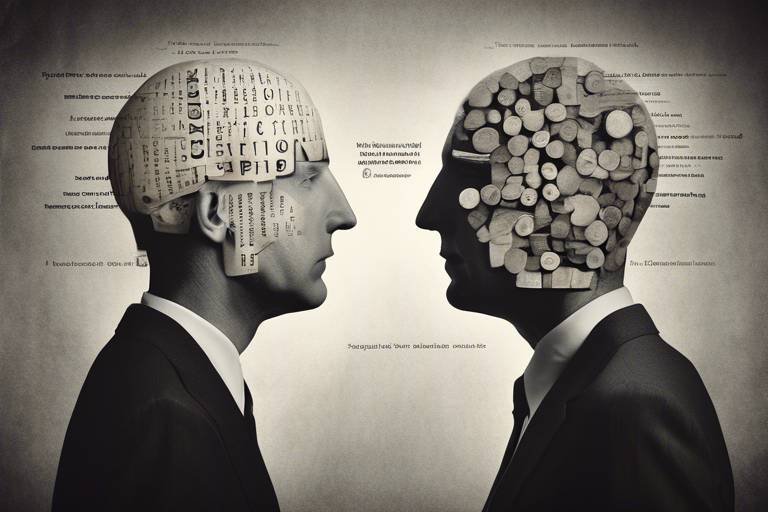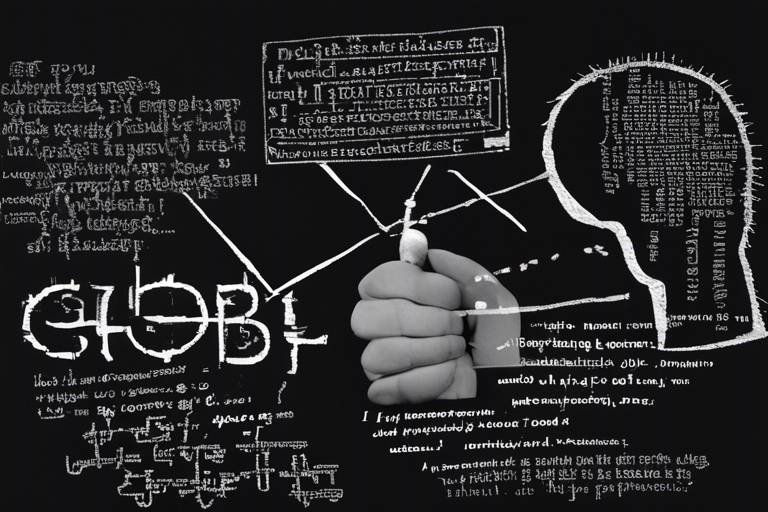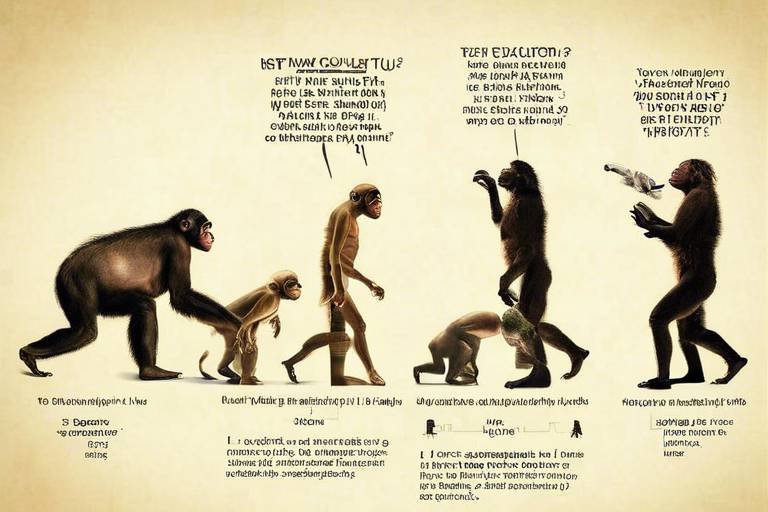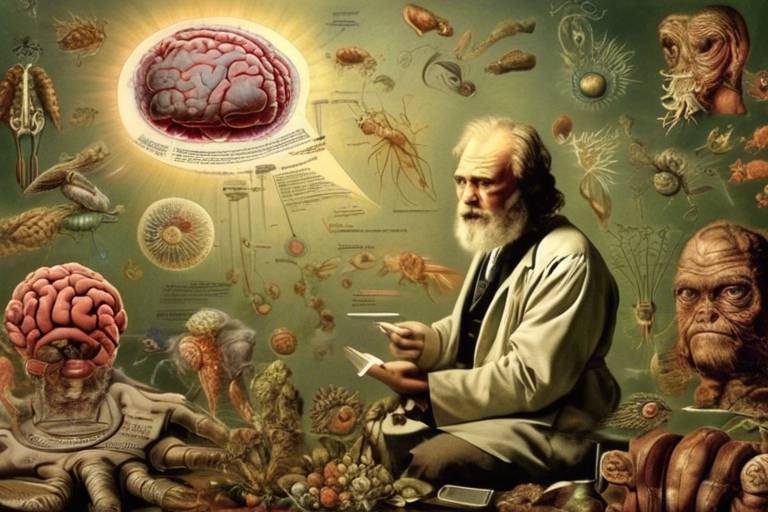How Quantum Mechanics is Influenced by Eastern Philosophy
The relationship between quantum mechanics and Eastern philosophy is a fascinating topic that invites us to rethink our understanding of reality, consciousness, and the universe itself. At first glance, these two fields may seem worlds apart—one rooted in the rigorous methodologies of science and the other in the contemplative traditions of ancient thought. However, as we delve deeper, we discover that they share striking similarities that challenge our conventional views. This article will explore these intriguing intersections, shedding light on how the profound insights of Eastern philosophies such as Buddhism and Taoism resonate with modern scientific theories, particularly in the realm of quantum mechanics.
Before we can appreciate the philosophical implications, it's essential to grasp the fundamentals of quantum mechanics. This branch of physics describes the behavior of matter and energy at the smallest scales—think atoms and subatomic particles. Unlike classical physics, which operates on predictable laws, quantum mechanics introduces a world of uncertainty and probability. Key principles such as superposition and entanglement defy our intuitive understanding of reality. For instance, particles can exist in multiple states simultaneously until observed, a phenomenon that raises questions about the role of the observer in shaping reality. This foundational shift sets the stage for a deeper exploration of how these scientific principles echo the tenets of Eastern philosophy.
Eastern philosophy encompasses a rich tapestry of traditions, including Buddhism, Taoism, and Confucianism. Each of these philosophies offers profound insights into the nature of existence, consciousness, and the interconnectedness of all things. For example, Buddhism emphasizes the concepts of impermanence and interconnectedness, which resonate deeply with the principles of quantum mechanics. Similarly, Taoism introduces the idea of the Tao—the fundamental nature of the universe that flows through all things, akin to the unpredictable nature of quantum phenomena. By examining these philosophies, we can uncover a framework that not only complements but also enhances our understanding of quantum mechanics.
One of the most compelling aspects of Buddhism is its focus on the nature of reality. Central to Buddhist thought are the ideas of impermanence and interconnectedness. These concepts align remarkably well with quantum mechanics, particularly the notion of non-locality and the observer effect. In quantum mechanics, the observer plays a crucial role in determining the state of a particle, mirroring the Buddhist view that reality is not fixed but rather shaped by our perceptions and experiences. This leads us to question: Is reality merely an illusion shaped by our consciousness? Both Buddhism and quantum mechanics invite us to explore this profound question, emphasizing the subjective nature of existence.
Both Buddhism and quantum mechanics challenge the traditional understanding of reality. In Buddhism, the concept of Sunyata, or emptiness, suggests that all phenomena lack inherent existence. Similarly, quantum mechanics reveals that particles do not possess definite properties until measured. This parallel raises intriguing questions about the essence of reality: Are we merely observers in a universe that is constantly in flux? The emphasis on subjective experience in both traditions encourages us to reconsider our assumptions and embrace a more fluid understanding of existence.
The relationship between consciousness and the physical world is another area where Buddhism and quantum mechanics converge. In Buddhist thought, the mind is not separate from the material world but rather intricately connected to it. This idea resonates with quantum theories that propose the observer's influence on the behavior of particles. Just as Buddhism teaches that our thoughts and intentions shape our reality, quantum mechanics suggests that consciousness plays a pivotal role in the fundamental workings of the universe. This connection invites us to explore the implications of our thoughts and actions in shaping the world around us.
Taoism offers additional insights that complement our understanding of quantum mechanics. The concept of the Tao represents the natural order of the universe, emphasizing the importance of Wu Wei, or effortless action. This idea parallels the unpredictable nature of quantum phenomena, where particles behave in ways that often defy our expectations. Just as Taoism encourages us to flow with the natural rhythms of life, quantum mechanics teaches us to embrace uncertainty and unpredictability as fundamental aspects of reality.
One of the most striking parallels between Eastern philosophy and quantum physics is the notion of interconnectedness. In Eastern thought, everything is seen as part of a vast web of existence, where every action has repercussions throughout the universe. This idea mirrors the phenomenon of quantum entanglement, where particles become interconnected in such a way that the state of one particle can instantaneously affect another, regardless of distance. This interconnectedness challenges our understanding of separation and individuality, inviting us to recognize the profound unity that underlies all existence.
Eastern philosophies often emphasize a non-dualistic perspective, suggesting that distinctions between self and other, mind and matter, are ultimately illusory. This view resonates with quantum mechanics, which challenges traditional dualistic frameworks. The idea that particles can exist in multiple states simultaneously and that their behavior can be influenced by observation compels us to reconsider our binary thinking. By embracing a non-dualistic perspective, we open ourselves to a more holistic understanding of reality that transcends conventional boundaries.
Integrating Eastern philosophical insights into scientific practice can foster a more holistic approach to research and understanding in quantum mechanics. By recognizing the interconnectedness of all things and the role of consciousness in shaping reality, scientists can cultivate a mindset that embraces uncertainty and complexity. This shift in perspective can lead to innovative approaches in scientific inquiry, encouraging collaboration across disciplines and promoting a deeper understanding of the universe.
- What is quantum mechanics? Quantum mechanics is a fundamental theory in physics that describes the behavior of matter and energy at the smallest scales, revealing a world of uncertainty and probability.
- How does Eastern philosophy relate to science? Eastern philosophies often emphasize interconnectedness, impermanence, and the role of consciousness, which resonate with modern scientific theories, particularly in quantum mechanics.
- What is the observer effect in quantum mechanics? The observer effect refers to the phenomenon where the act of observing a particle influences its state, highlighting the role of consciousness in shaping reality.
- Can Eastern philosophy enhance scientific inquiry? Yes, integrating insights from Eastern philosophy can foster a more holistic approach to research, encouraging collaboration and a deeper understanding of complex phenomena.

The Foundations of Quantum Mechanics
Quantum mechanics is a fascinating realm of physics that fundamentally challenges our classical understanding of the universe. At its core, it reveals a world that operates on principles vastly different from those we encounter in our everyday lives. Imagine a reality where particles can exist in multiple states simultaneously, or where the mere act of observation can alter the outcome of an experiment. These concepts, once relegated to the realm of science fiction, are now the bedrock of quantum theory.
One of the key principles of quantum mechanics is the superposition principle. This principle suggests that particles, such as electrons, can exist in a state of multiple possibilities at once until they are measured. It’s akin to flipping a coin and having it spin in the air; it remains both heads and tails until it lands. This idea not only reshapes our understanding of particles but also raises profound questions about the nature of reality itself.
Another cornerstone of quantum mechanics is quantum entanglement. This phenomenon occurs when particles become intertwined in such a way that the state of one particle instantly influences the state of another, regardless of the distance separating them. Imagine two dancers performing a perfectly synchronized routine, even if they are miles apart. This peculiar behavior defies classical physics, which asserts that information cannot travel faster than the speed of light, and suggests a deep interconnectedness within the fabric of the universe.
Moreover, the observer effect introduces a fascinating twist to our understanding of reality. In essence, this principle posits that the act of observation can change the state of a quantum system. It’s as if the universe is aware of our presence and adjusts accordingly. This leads us to ponder: if our consciousness can influence reality, what does that mean for our understanding of existence itself?
To summarize, the foundations of quantum mechanics are built upon principles that challenge our classical views and invite us to reconsider the nature of reality. Here’s a quick overview of these foundational concepts:
| Key Principle | Description |
|---|---|
| Superposition | Particles can exist in multiple states simultaneously until measured. |
| Quantum Entanglement | Particles become interconnected, influencing each other instantaneously over distances. |
| Observer Effect | The act of observation alters the state of a quantum system. |
These principles not only redefine our understanding of the physical world but also open the door to a dialogue between science and philosophy. As we delve deeper into the mysteries of quantum mechanics, we find ourselves standing at the crossroads of knowledge, where the insights of Eastern philosophies may offer valuable perspectives on the nature of reality.

Eastern Philosophy: An Overview
Eastern philosophy is a rich tapestry woven from various traditions that have flourished over millennia, offering profound insights into the nature of existence, consciousness, and the universe. At its core, Eastern philosophy encompasses a range of schools of thought, including Buddhism, Taoism, and Confucianism, each contributing unique perspectives that often resonate with modern scientific inquiry. Unlike Western philosophy, which tends to emphasize analytical reasoning and compartmentalization, Eastern thought embraces a more holistic approach, emphasizing the interconnectedness of all things and the fluidity of existence.
Buddhism, for instance, teaches principles such as impermanence and interconnectedness, suggesting that everything is in a constant state of flux and that no entity exists in isolation. This mirrors the findings in quantum mechanics, where particles are not just individual entities but are often entangled, affecting one another across vast distances. Similarly, Taoism introduces the concept of the Tao, which can be understood as the fundamental principle that underlies and unites the universe, promoting a sense of harmony and balance that is echoed in the unpredictable nature of quantum phenomena.
Confucianism, while more focused on social ethics and governance, also offers valuable insights into human behavior and relationships, emphasizing the importance of harmony in personal and communal life. This emphasis on relational dynamics can be likened to the interactions observed in quantum mechanics, where particles influence each other in complex ways that challenge our conventional understanding of separateness.
In essence, Eastern philosophical traditions invite us to question our perceptions of reality, urging us to look beyond surface appearances and recognize the deeper connections that bind us to each other and the universe. This perspective not only enriches our understanding of philosophical concepts but also opens up new avenues for scientific exploration, particularly in the realm of quantum mechanics. As we delve deeper into these ancient teachings, we may find that they offer invaluable guidance in navigating the mysteries of existence and the intricate dance of particles that compose our reality.
As we explore the intersections between these philosophical traditions and quantum mechanics, it becomes clear that both realms challenge us to reconsider the nature of reality itself. By embracing the teachings of Eastern philosophy, we can cultivate a more profound understanding of the universe and our place within it, fostering a sense of wonder and curiosity that drives both scientific inquiry and spiritual exploration.

Key Concepts in Buddhism
Buddhism, with its rich tapestry of teachings and philosophies, offers profound insights that resonate intriguingly with the principles of quantum mechanics. One of the most significant concepts in Buddhism is impermanence (Anicca), which teaches that all things are in a constant state of flux. This idea parallels the unpredictable nature of quantum particles, which exist in states of probability rather than fixed positions. Just as a river is never the same from one moment to the next, the quantum world is characterized by change and uncertainty. This perspective invites us to reconsider our understanding of reality, urging us to embrace the transient nature of existence.
Another foundational Buddhist principle is interconnectedness (Pratītyasamutpāda), which posits that all phenomena are interdependent and arise in relation to one another. This notion resonates deeply with the phenomenon of quantum entanglement, where particles become interconnected in ways that defy classical explanations. Imagine two entangled particles as dance partners; even when separated by vast distances, a change in one will instantaneously affect the other. This challenges our conventional views of separateness and individuality, suggesting that we are all part of a larger, interconnected web of existence.
Furthermore, Buddhism emphasizes the role of the observer, which aligns seamlessly with the quantum mechanics concept known as the observer effect. In quantum physics, the act of observation can influence the state of a particle, much like how our perceptions and consciousness shape our understanding of reality. This invites a fascinating exploration of the relationship between mind and matter. In Buddhism, the mind is not just a passive observer; it plays an active role in shaping our experiences. This perspective encourages us to reflect on how our consciousness interacts with the physical world, potentially altering it in ways we are only beginning to understand.
In summary, the key concepts of Buddhism—impermanence, interconnectedness, and the significance of the observer—offer rich parallels to the principles of quantum mechanics. They challenge us to rethink our perceptions of reality and encourage a more holistic understanding of the universe. As we delve deeper into these connections, we find that both Buddhism and quantum mechanics invite us to explore the mysteries of existence, urging us to embrace uncertainty and interconnectedness in our lives.

The Nature of Reality
The nature of reality is a concept that has puzzled thinkers for centuries, and both quantum mechanics and Buddhism take a unique approach to this enigma. At its core, quantum mechanics challenges our classical understanding of reality, revealing a world that is not as straightforward as it seems. Imagine for a moment that the universe is like a vast, intricate tapestry, where every thread is interconnected and influences the others in ways that are not always visible. This idea resonates deeply with Buddhist philosophy, which teaches that reality is not a fixed entity but rather a dynamic interplay of experiences and perceptions.
In quantum mechanics, we encounter phenomena such as superposition and entanglement, which suggest that particles can exist in multiple states simultaneously and that their behaviors are interdependent, regardless of distance. This challenges the classical notion of separateness, much like the Buddhist concept of interconnectedness. Both perspectives encourage us to reconsider what we accept as 'real.' Are we merely observers in a predetermined universe, or do our perceptions actively shape the reality we experience? This question leads us to ponder the role of the observer, a critical element in both quantum theory and Buddhist thought.
Moreover, both Buddhism and quantum mechanics emphasize the importance of subjective experience. In Buddhism, the idea of impermanence teaches us that nothing is static; everything is in a constant state of flux. This is mirrored in the quantum realm, where particles are never truly at rest and are always in a state of potentiality until observed. Just as a river flows continuously, so too does reality shift and change, shaped by our interactions and observations. This fluidity suggests that our understanding of reality is not merely a passive reception of information but an active participation in the unfolding of existence.
To illustrate this further, consider the following table comparing key aspects of reality as viewed through the lenses of quantum mechanics and Buddhism:
| Aspect | Quantum Mechanics | Buddhism |
|---|---|---|
| Nature of Existence | Dynamic and probabilistic | Impermanent and ever-changing |
| Observer's Role | Influences the state of particles | Shapes personal reality through perception |
| Interconnectedness | Entangled particles affect each other | All beings are interconnected |
In conclusion, the exploration of reality through the lenses of both quantum mechanics and Buddhism invites us to embrace a more nuanced understanding of existence. By acknowledging the fluidity of reality and our role as active participants, we can begin to see the profound connections between science and spirituality. This intersection not only enriches our comprehension of the universe but also encourages a deeper exploration of our own consciousness and the nature of our experiences.
- What is the observer effect in quantum mechanics? The observer effect refers to changes that the act of observation can make on a phenomenon being observed, suggesting that the observer plays a crucial role in shaping reality.
- How does Buddhism view the concept of self? Buddhism teaches that the self is an illusion, a collection of experiences rather than a fixed entity, which aligns with quantum mechanics' challenge to traditional notions of separateness.
- Can Eastern philosophy and quantum mechanics coexist? Yes, many scholars argue that the insights from Eastern philosophy can provide a complementary perspective to the scientific understanding of the universe, enriching our overall comprehension of reality.

Mind and Matter
The relationship between mind and matter has fascinated thinkers for centuries, and both Buddhism and quantum mechanics offer profound insights into this intricate connection. In Buddhism, the concept of mind is not merely an isolated entity; rather, it is seen as a part of a larger, interconnected reality. This perspective resonates deeply with quantum mechanics, where the observer plays a crucial role in shaping the physical world. Just as a butterfly flapping its wings can create ripples across the ocean, our consciousness can influence the very fabric of reality.
In quantum mechanics, the observer effect suggests that the act of observation can alter the outcome of an experiment. This phenomenon challenges our traditional understanding of reality, where we often view the observer as separate from the observed. Similarly, Buddhism teaches that our perceptions and thoughts shape our experiences. This brings us to a fascinating question: if our minds can influence reality, what does that say about our role in the universe? Are we mere spectators, or active participants in the unfolding of existence?
To better understand this relationship, let’s consider a few key ideas:
- Consciousness as a Creative Force: In both Buddhism and quantum physics, consciousness is not just a passive receiver of information; it actively shapes reality. This idea challenges the notion of a deterministic universe, suggesting instead that our thoughts and intentions can manifest tangible changes in the world around us.
- The Illusion of Separation: Buddhism emphasizes the illusion of a separate self, proposing that all beings are interconnected. Quantum mechanics echoes this sentiment through the phenomenon of entanglement, where particles remain connected across vast distances, influencing each other instantaneously.
- Mindfulness and Observation: The practice of mindfulness in Buddhism encourages individuals to observe their thoughts and feelings without judgment. This aligns with the scientific principle that observation itself can affect outcomes, suggesting that a mindful approach can lead to a deeper understanding of both the mind and the material world.
In essence, both disciplines invite us to reconsider our understanding of reality. Just as the quantum world defies our classical intuitions, so too does the Buddhist view of mind challenge our perceptions of self and existence. The interplay between mind and matter is not just a philosophical debate; it is a profound exploration of how we engage with the universe. By embracing these insights, we can cultivate a more holistic understanding of our place in the cosmos.
- What is the observer effect in quantum mechanics? The observer effect refers to changes that the act of observation can make on a phenomenon being observed, suggesting that consciousness plays a role in shaping reality.
- How does Buddhism view consciousness? Buddhism sees consciousness as interconnected with all aspects of reality, emphasizing that our thoughts and perceptions shape our experiences.
- What is quantum entanglement? Quantum entanglement is a phenomenon where particles become interconnected in such a way that the state of one instantly influences the state of another, regardless of the distance separating them.
- Can Eastern philosophy inform scientific practices? Yes, integrating Eastern philosophical insights can foster a more holistic approach to research, encouraging scientists to consider the interconnectedness of all phenomena.

Insights from Taoism
Taoism, an ancient Chinese philosophy, offers profound insights that resonate remarkably with the principles of quantum mechanics. At the heart of Taoism lies the concept of the Tao, often translated as "the Way." This idea embodies the natural order of the universe, emphasizing harmony and balance. Much like quantum mechanics, which reveals a universe filled with unpredictability and interdependence, Taoism encourages us to embrace the fluidity of existence. Have you ever noticed how the flow of a river can change direction unexpectedly? This is akin to the unpredictable nature of particles at the quantum level, where outcomes can shift based on the observer's perspective. Just as a river finds its own path, quantum particles navigate their existence through a dance of probabilities.
Another essential Taoist concept is Wu Wei, which translates to "non-action" or "effortless action." This principle suggests that one should align with the natural flow of the universe rather than resist it. In quantum mechanics, we see a similar idea where particles do not follow a strict path but rather exist in a state of potentiality until observed. This notion challenges our traditional understanding of agency and control, prompting us to rethink our role in the cosmos. Imagine trying to catch a butterfly; the more you chase it, the more it evades you. However, if you sit quietly and allow it to approach, it may land on your shoulder. Wu Wei teaches us that sometimes, the best way to engage with the universe is to let go and allow things to unfold naturally.
The interplay between Taoism and quantum mechanics also extends to the understanding of duality. In traditional Western philosophy, we often view reality through a dualistic lens—good vs. evil, mind vs. body, observer vs. observed. However, both Taoism and quantum theory invite us to consider a more integrated perspective. The Taoist belief in the interconnectedness of all things aligns with the quantum phenomenon of entanglement, where particles can instantaneously affect each other regardless of distance. This suggests that our perception of separation is merely an illusion, and that at a fundamental level, everything is intertwined. Just as the Tao weaves through all aspects of life, quantum mechanics reveals a web of connections that challenge our understanding of individuality.
In summary, the insights from Taoism provide a rich framework for understanding quantum mechanics. By embracing the concepts of the Tao and Wu Wei, we can cultivate a mindset that appreciates the inherent unpredictability and interconnectedness of the universe. This philosophical perspective not only enriches our understanding of scientific principles but also encourages a more harmonious approach to life. As we continue to explore the depths of quantum mechanics, let us remain open to the wisdom of Eastern philosophies, allowing them to guide us toward a more holistic understanding of reality.
- What is Taoism? Taoism is an ancient Chinese philosophy that emphasizes living in harmony with the Tao, or the natural order of the universe.
- How does Taoism relate to quantum mechanics? Taoism's principles of flow, interconnectedness, and non-duality resonate with the unpredictable and entangled nature of quantum mechanics.
- What is Wu Wei? Wu Wei is a Taoist concept that means 'non-action' or 'effortless action,' encouraging individuals to align with the natural flow of life.
- Can Eastern philosophy enhance scientific understanding? Yes, integrating insights from Eastern philosophies can foster a holistic approach to scientific inquiry, particularly in complex fields like quantum mechanics.

Interconnectedness in Quantum Physics
When we dive into the fascinating world of quantum physics, one concept that stands out like a beacon is the idea of interconnectedness. This notion isn't just a fancy term; it’s a fundamental principle that reshapes our understanding of the universe. Imagine the universe as a vast web, where every thread is connected to another, vibrating in harmony. In quantum mechanics, particles are not isolated entities; rather, they exist in a state of profound connection with one another, a phenomenon known as quantum entanglement.
Quantum entanglement reveals that when two particles become entangled, the state of one particle instantly influences the state of another, regardless of the distance separating them. This is mind-boggling! It’s as if the universe is whispering a secret that transcends time and space, suggesting that everything is intertwined in ways we are only beginning to understand. You might be wondering, how does this relate to Eastern philosophies? Well, many Eastern traditions, particularly Buddhism and Taoism, emphasize the interconnectedness of all things, portraying a holistic view of existence that resonates deeply with quantum mechanics.
To put it simply, just as Eastern philosophies teach that every action has a ripple effect in the cosmos, quantum physics shows us that the particles that make up our reality are inextricably linked. This interconnectedness can be summarized in a few key points:
- Non-Locality: In quantum mechanics, non-locality suggests that particles can affect each other instantaneously, no matter how far apart they are. This challenges our classical understanding of distance and separation.
- Holistic Perspective: Both Eastern philosophies and quantum physics advocate for a holistic view, where the whole is greater than the sum of its parts. It’s about seeing the bigger picture.
- Interdependence: Just as everything in nature is interdependent, quantum particles reveal that their properties and behaviors are intertwined, highlighting a fundamental unity in diversity.
This profound interconnectedness invites us to reconsider our place in the universe. It prompts us to ask questions like: Are we merely observers in a detached reality, or are we active participants in a grand tapestry of existence? This inquiry mirrors the teachings of Buddhism, which emphasizes that our thoughts and actions are deeply intertwined with the world around us. The implications of these ideas extend beyond theoretical physics; they challenge us to embrace a more integrated approach to life, one that recognizes our role in the cosmic dance.
In summary, the concept of interconnectedness in quantum physics is not just a scientific principle; it’s a philosophical revelation that encourages us to see beyond the surface of reality. As we continue to explore the mysteries of the quantum realm, we may find that the wisdom of Eastern philosophies can guide us toward a deeper understanding of the universe and our place within it. The journey into this interconnected reality is not just about particles and waves; it’s about embracing the unity that lies at the heart of existence.
- What is quantum entanglement? Quantum entanglement is a phenomenon where two or more particles become linked, so that the state of one particle can instantaneously affect the state of another, regardless of the distance between them.
- How does interconnectedness relate to Eastern philosophy? Eastern philosophies, such as Buddhism and Taoism, emphasize the interconnectedness of all things, which parallels the quantum mechanics principle that particles are interdependent and influence one another.
- Why is the concept of interconnectedness important? Understanding interconnectedness helps us realize that our actions have broader implications, encouraging a more holistic approach to life and science.

Non-Duality and Quantum Theory
When we dive into the concept of non-duality, we begin to unravel a tapestry of ideas that challenge our conventional understanding of reality. In Eastern philosophy, particularly within traditions like Buddhism and Taoism, non-duality suggests that the distinctions we make between self and other, subject and object, or mind and matter are ultimately illusory. This perspective resonates deeply with the principles of quantum mechanics, where the traditional boundaries of classical physics begin to blur.
At its core, quantum mechanics reveals a universe that is not just a collection of separate entities but rather a web of intricate relationships. For instance, consider the phenomenon of quantum entanglement. This mind-bending effect occurs when particles become intertwined, such that the state of one particle instantly influences the state of another, regardless of the distance separating them. This behavior echoes the non-dualistic view that everything is interconnected, challenging the notion of isolated existence.
Furthermore, the dualistic perspective—where we see a clear divide between observer and observed—falls apart in the quantum realm. The act of observation itself plays a crucial role in determining the state of a quantum system. This aligns with the non-dual understanding that the observer is not separate from the observed; rather, they are part of a unified whole. Just as a wave and particle can be two sides of the same coin in quantum mechanics, the observer and the observed are two aspects of the same reality.
To illustrate this concept further, let’s consider the famous double-slit experiment. When particles like electrons are fired at a barrier with two slits, they create an interference pattern, suggesting they behave like waves. However, when we attempt to observe which slit the particle goes through, it behaves like a particle, collapsing the wave function. This phenomenon raises profound questions about the nature of reality: Is it the act of observation that creates reality? And if so, what does that imply about our role in the universe?
In essence, both non-duality and quantum theory invite us to reconsider our understanding of existence. They suggest that reality is not a fixed entity but a dynamic process shaped by interactions and perceptions. This perspective encourages a shift from a rigid, dualistic view of the world to one that embraces complexity, interdependence, and the fluid nature of existence.
As we explore these intersections further, we might ask ourselves: What practical implications does this have for our everyday lives? By embracing a non-dual perspective, we can cultivate a sense of interconnectedness that fosters compassion, empathy, and a deeper understanding of our place in the cosmos. Just as quantum mechanics reshapes our understanding of physical reality, non-duality can reshape our understanding of our relationships with others and the world around us.
In conclusion, the dialogue between non-duality and quantum theory opens up a realm of possibilities that beckons us to explore deeper truths about existence. It challenges us to see beyond the surface and recognize the profound connections that bind us all together in this vast, mysterious universe.
- What is non-duality? Non-duality is a philosophical concept that suggests there is no fundamental separation between self and other, or subject and object. It emphasizes the interconnectedness of all things.
- How does quantum mechanics relate to non-duality? Quantum mechanics challenges traditional dualistic views by demonstrating that the observer and the observed are interconnected, much like the non-dual perspective in Eastern philosophy.
- What is quantum entanglement? Quantum entanglement is a phenomenon where particles become linked, such that the state of one particle instantly affects the state of another, regardless of the distance separating them.
- Can non-duality influence our daily lives? Yes, embracing a non-dual perspective can foster compassion and empathy, encouraging us to view our relationships and interactions with a deeper understanding of interconnectedness.

Practical Applications of Eastern Thought
Integrating Eastern philosophical insights into the realm of quantum mechanics isn't just an abstract exercise; it has real-world implications that can enhance our understanding and approach to science. Imagine walking into a laboratory where the principles of Buddhism and Taoism guide the research methodologies. This fusion can lead to a more holistic perspective that embraces uncertainty and interconnectedness, which are pivotal in quantum studies. By applying these philosophies, scientists can foster a mindset that values introspection and collaboration, ultimately leading to groundbreaking discoveries.
For instance, the concept of impermanence from Buddhism encourages researchers to embrace change and adaptability in their experiments. Quantum mechanics is inherently unpredictable; thus, adopting a flexible approach allows scientists to pivot when faced with unexpected results. This adaptability mirrors the Buddhist practice of mindfulness, where being present and open to new experiences can yield profound insights. In this light, researchers might find themselves more attuned to the subtleties of their findings, leading to innovative interpretations and theories.
Moreover, the Taoist principle of Wu Wei, or effortless action, can inspire a more intuitive approach to scientific inquiry. Instead of forcing outcomes, scientists can learn to flow with the natural rhythms of their research, akin to how water carves its path through solid rock. This perspective not only reduces stress but also enhances creativity, allowing for spontaneous ideas to emerge in the lab. By cultivating an environment where intuitive thinking is valued, researchers may stumble upon unexpected connections that traditional methods might overlook.
Incorporating Eastern thought into scientific practice also promotes a sense of interconnectedness among researchers. Just as quantum entanglement suggests that particles can be linked regardless of distance, fostering a collaborative spirit among scientists can lead to a more integrated approach to research. When teams operate under the belief that their work contributes to a larger tapestry of knowledge, they are more likely to share insights and support one another, creating a vibrant community of inquiry.
Furthermore, the application of Eastern philosophies can extend beyond the laboratory. Consider the educational frameworks that teach quantum mechanics: integrating concepts from Eastern thought can make these complex ideas more accessible. For example, using storytelling—a technique prevalent in Eastern traditions—can help demystify quantum phenomena, making them relatable and easier to grasp for students. This method not only engages learners but also encourages them to think critically about the material, fostering a deeper understanding.
Ultimately, the practical applications of Eastern thought in quantum mechanics advocate for a paradigm shift in how we approach scientific inquiry. By embracing principles such as interconnectedness, adaptability, and intuitive understanding, we can cultivate a richer, more nuanced perspective that not only respects the complexities of the universe but also enhances our pursuit of knowledge. As we continue to explore the fascinating intersections of science and philosophy, we might just unlock new realms of understanding that challenge our very notions of reality.
- How can Eastern philosophy improve scientific research? Eastern philosophy encourages adaptability, mindfulness, and interconnectedness, which can foster a more holistic approach to scientific inquiry.
- What is Wu Wei and how does it relate to science? Wu Wei, or effortless action, promotes a natural flow in research, encouraging scientists to embrace spontaneity and intuition in their work.
- Can Eastern thought make quantum mechanics more accessible? Yes, integrating storytelling and relatable concepts from Eastern traditions can help demystify complex quantum ideas for students and the general public.
Frequently Asked Questions
- What is quantum mechanics?
Quantum mechanics is a fundamental theory in physics that describes the physical properties of nature at the scale of atoms and subatomic particles. It challenges classical physics with concepts like wave-particle duality and uncertainty, leading to a deeper understanding of the universe.
- How does Eastern philosophy relate to quantum mechanics?
Eastern philosophies, particularly Buddhism and Taoism, offer insights that resonate with quantum mechanics. Concepts such as interconnectedness, impermanence, and the observer effect highlight parallels between these ancient teachings and modern scientific theories.
- What are some key concepts in Buddhism that align with quantum mechanics?
Buddhism emphasizes impermanence and interconnectedness, which mirror quantum mechanics' principles of non-locality and the observer effect. These ideas suggest that reality is fluid and interconnected, challenging our traditional views of separation and permanence.
- Can you explain the concept of non-duality in Eastern philosophy?
Non-duality is a key principle in many Eastern philosophies, suggesting that distinctions between self and other, mind and matter, are ultimately illusions. This perspective aligns with quantum mechanics' challenge to dualistic views, proposing a more unified understanding of reality.
- What is quantum entanglement and how does it relate to interconnectedness?
Quantum entanglement is a phenomenon where particles become interconnected in such a way that the state of one immediately influences the state of another, regardless of distance. This mirrors the Eastern philosophical notion of interconnectedness, suggesting that all things are fundamentally linked.
- How can integrating Eastern thought enhance scientific research?
By incorporating Eastern philosophical insights, scientists can adopt a more holistic approach to research. This perspective encourages openness to the unknown and fosters creativity, potentially leading to breakthroughs in understanding complex phenomena like quantum mechanics.



















